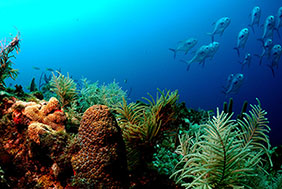Background Materials
Why Corals Care About OA? Uncovering the mechanism
Cohen, A. L. & M. Holcomb. Oceanography, Volume 22, No. 4, (2009)
OA reduces the pH and thus the abundance of carbonate ions in seawater. Corals living in acidified seawater continue to produce CaCO3. However, in acidified seawater, corals are unable to elevate the concentration of carbonate ions to the level required for normal skeletal growth. Reprinted, with permission, from the Oceanography journal ©2009 by Oceanography. http://www.tos.org/oceanography/
Download PDF
Observing OA from Space
Gledhill, D.G., R. Wanninkhof, M. Eakin, Oceanography, Volume 22, No. 4, (2009)
Space –based observations provide synoptic coverage of surface ocean temperature, winds, sea surface height, and color useful to a wide range of applications. These measurements are increasingly applied to monitor large-scale environmental and climate processes, including OA. Reprinted, with permission, from the Oceanography journal ©2009 by Oceanography http://www.tos.org/oceanography/
Dowload PDF
Coral Reefs and OA
Kleypas & Yates, Oceanography, Volume 22, No. 4, (2009)
It has been estimated that corals will calcify 10–50% less relative to pre-industrial rates by the middle of this century. This decreased calcification is likely to affect their ability to function within the ecosystem and will almost certainly affect the workings of the ecosystem itself. Reprinted, with permission, from the Oceanography journal ©2009 by Oceanography http://www.tos.org/oceanography/
Dowload PDF
OA – A Critical Emerging Problem for the Ocean Sciences
Doney, S.C., M.B. Balch, V.J. Fabry, R.A. Feely, Oceanography, Volume 22, No.4, (2009)
OA has become one of the most critical and pressing issues facing the ocean research community. This introductory article presents a brief introduction on OA and some historical context for how it emerged so quickly and recently as a key research topic. Reprinted, with permission, from the Oceanography journal ©2009 by Oceanography http://www.tos.org/oceanography/
Dowload PDF
Scientific Synthesis of the Impacts of OA on Marine Biodiversity
Doney, S.C., M.B. Balch, V.J. Fabry, R.A. Feely, Oceanography, Volume 22, No.4, (2009)
Summary of global status and trends of OA, and scientific synthesis of its potential impacts in benthic and pelagic communities, as well as ecosystem responses, and its social and economic consequences (60 pgs).
Dowload PDF
The coral reef crisis: The critical importance of <350 ppm CO2
Veron, J.E.N. et al, Marine Pollution Bulletin, 58 (2009)
At today’s CO2 levels of 394 ppm, most reefs worldwide are committed to an irreversible decline. Mass bleaching will become annual. Bleaching will be exacerbated by degraded water-quality and increased severe weather events.
Dowload PDF
Climate, Carbon and Coral Reefs
World Meteorological Organization (2010)
This publication, done in cooperation with the UN, summarizes the CO2 threat to coral reefs, the science supporting projections and the solutions that are needed to prevent the loss of one of the world’s natural wonders (32 pgs).
Dowload PDF
OA for Policy Makers
2nd Symposium on the Ocean in a high CO2 world (2009)
A short publication that succinctly presents the challenges that OA represent to diverse ecosystem and human enterprises.
Dowload PDF
Acidification and Coral Reefs
Coral Reef Initiatives for the Pacific (CRISP) (Oct 2009)
Introductory paper on OA, offering observed effects on corals and predictions for 2100.
Dowload PDF
OA FAQs
Woods Hole Oceanographic Institute EPOCHA Project (March 2010)
A concise paper outlining essential OA concepts: from the meaning of the term to how it’s measured and effects on calcification and photosynthesis..
Dowload PDF


